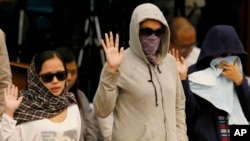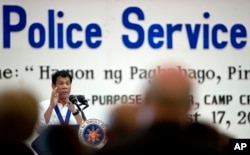A war on drugs campaign in the Philippines, launched by populist President Rodrigo Duterte in July, has triggered widespread debate over rights abuses as the government grapples with almost four million drug users nationwide.
A special senate inquiry this week, chaired by former Justice Secretary and now senator, Leila De Lima, highlighted the divisions between rights advocates and those backing Duterte’s hard-line law and order policy.
Duterte, a former mayor, was elected by a landslide in May after threatening tough measures, including extrajudicial solutions to crime and drug issues.
The Senate inquiry was prompted by the escalating death tolls, homes searches, and arrests across the country as the campaign, code named “Double Barrel”, gained momentum.
By the numbers
Now seven weeks into the campaign, the Senate inquiry heard the death toll by police killings of suspects and illegal vigilante murders had reached 1,800.
Local media have shown the bodies of small time traffickers shot and killed by alleged vigilantes spurred on by the crackdown.
The Philippine Center for Investigative Journalism (PCIJ) reported soon after the campaign’s launch that police had mounted raids in over 40,000 homes across the country, many in the southern region of Zamboanga Peninsula and Northern Mindanao.
Philippine National Police chief, Ronald Dela Rosa, told the inquiry there are some 3.7 million drug users nationwide. Since July 1 to August 21, he said, police have detained a total of 10,153 alleged drug pushers and users, with more than 600,000 individuals surrendering to authorities.
Police operations alone had resulted in 718 deaths, while more than 1,080 people were killed by “various syndicate groups involved with illegal drugs,” Dela Rosa said.
Pros and cons
Chairperson De Lima said the escalating death toll was a key concern and reason for calling the inquiry.
“What is particularly worrisome is that the campaign against drugs seems to be an excuse for some, may I just emphasize some law enforcers and other elements like vigilantes, to commit murder with impunity,” De Lima said.
But a supporter of the campaign, Senator Alan Peter Cayteno, believes Duterte’s hard line policy is bringing results.
“The old norm was drug lords and their cohorts acted with impunity. People had low trust of the PNP [Philippine National Police] officers, judges, high ranking government officials, are involved in the illegal trade or [act as] protectors,” Cayteno said. “Now the respect and fear for the law had been restored. Drug lords and their supporters are on the run. People are beginning to feel safe, renewed trust of our law enforcers and government under President Duterte.”
But the campaign has triggered stinging criticism from rights advocates domestically and internationally.
Outsiders speak out
Several United Nations agencies – including the UN’s Office on Drugs and Crime (UNODC) have also criticized the policy. The UNODC’s executive director, Yury Fedotov, said he was “greatly concerned” of the rising death toll.
Two UN human rights experts, Agnes Callamard – a special rapporteur on summary executions -- and Dainius Puras – special rapporteur on the right to health – called for the Philippine Government to halt the wave of extrajudicial killings.
Duterte lashed out at the UN officials, saying that in commenting they had broken protocol and even threatening to withdraw the Philippines from the UN. The threat was later withdrawn by the Philippine Foreign Minister, who said the president was “frustrated”.
Philippine Police Chief Dela Rosa denied police were behind any extra judicial killings.
“If any policeman is found that he violated laws on self-defense, he will be investigated, prosecuted and accordingly punished. On speculations on vigilante killing, the PNP does not and will never condone vigilante killings,” Dela Rosa said.
But rights bodies such as the New York-based Human Rights Watch and Amnesty International, have raised alarm over rights violations tied to the campaign.
Human Rights Watch’s deputy Asia director, Phil Robertson, said the numbers of outright abuses under the campaign were “absolutely shocking”.
“During [Monday’s] senate hearing it became apparent that some police operations didn’t even follow basic police procedures, including failing to secure arrest or search warrants,” Robertson said in an email to VOA.
On Monday, the Philippines’ powerful church leaders joined calls for the government to reexamine its policy and the “correctness of its approach” in eradicating the illegal drug trade.
Philippine Senator, Risa Hontiveros, told the inquiry there was a need to “shift the focus of this war on drugs from vendetta to real justice.”
“The war on drugs should not be reduced to killings. It must be a just campaign to promote new beginnings. I believe that in the government’s war against drugs we cannot play gods and decide whose lives matters and whose lives don’t,” Hontiveros said.





